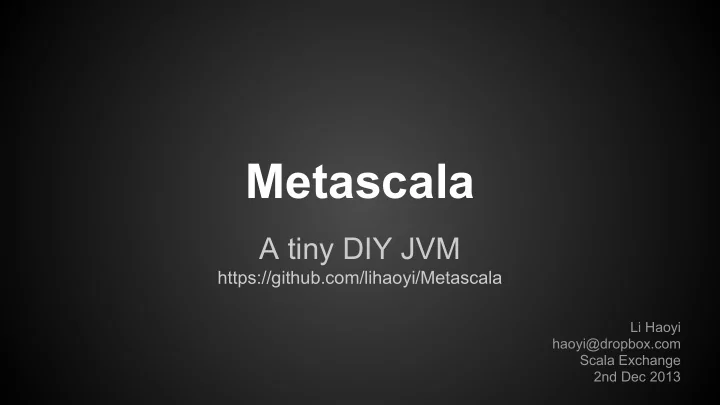

Metascala A tiny DIY JVM https://github.com/lihaoyi/Metascala Li Haoyi haoyi@dropbox.com Scala Exchange 2nd Dec 2013
Who am I? Li Haoyi Write Python during the day Write Scala at night
What is Metascala? ● A JVM ● in 3000 lines of Scala ● Which can load & interpret java programs ● And can interpret itself!
Size comparison ● Metascala: ~3,000 lines ● Avian JVM: ~80,000 lines ● OpenJDK: ~1,000,000 lines
Create a new metascala VM Basic Usage Plain Old Java Object Captured variables are serialized into VM’s environment Closure’s class file is given to VM to load/parse/execute Result is extracted from VM into host environment Any other classes necessary to evaluate the closure are loaded No global state from the current Classpath
It’s Metacircular! Need to give the outer VM more than the 1mb default heap VM inside a VM! Simpler program avoids initializing the scala/java std libraries, which takes forever under double-interpretation. Takes a while (~10s) to produce result
Limitations ● Single-threaded ● Limited IO ● Slowww
Performance Comparison ● OpenJDK: 1.0x ● Metascala: ~100x ● Meta-Metascala: ~10000x
Why Metascala? ● Fun to explore the innards of the JVM ● An almost-fully secure Java runtime! ● Small size makes fiddling fun
Why Metascala? ● Fun to explore the innards of the JVM ● An almost-fully secure Java runtime! ● Small size makes fiddling fun
Quick Tour Immutable Defs: ~380 loc Native Bindings: ~650 loc Bytecode SSA transform: ~650 loc Runtime data structures: 820 loc Binary heap & Copying GC: 132 loc DIY scala-pickling: 132 loc “This is a VM”: 243 loc
Quick Tour: Tests Tests for basic Java features GC Fuzz-tests Test Metacircularity! Scala std lib usage
What’s a Heap? Fig 1. A Heap
What’s a Garbage Collector? Blit (copy) all roots to new heap Stop when you’ve scanned everything Scan the already copied things for more things and Not pseudocode copy them too
Why Metascala? ● Fun to explore the innards of the JVM ● An almost-fully secure Java runtime! ● Small size makes fiddling fun
Limited Instruction Count
And Limited Memory! Not an OOM Error! We throw this ourselves
Explicitly defined capabilities Every external call has to be explicitly defined and enabled
Security Characteristics ● Finite instruction count ● Finite memory ● Well-defined interface to outside world ● Doesn’t rely on Java Security Model at all! ● Still some holes…
Security Holes ● Classloader can read from anywhere ● Time spent classloading not accounted ● Memory spent on classes not accounted ● GC time not accounted ● “native” methods’ time/memory not accounted
Basic Problem Outside World User code resource consumption is bounded Classes Native method calls User VM’s runtime resource Code Runtime Data usage can be made to Structures Garbage Collector grow arbitrarily large
Possible Solution Outside World Fixed Unaccounted Costs Put a VM Inside a VM! Outside World Classes Native method calls Works, User Code Runtime Data ... but 10000x slowdown Structures Garbage Collector
Another Possible Solution Move more components into Outside World virtual runtime Native method calls Classes Garbage Collector User Code Difficult to bootstrap correctly Runtime Data Structures WIP
Why Metascala? ● Fun to explore the innards of the JVM ● An almost-fully secure Java runtime! ● Small size makes fiddling fun
Live Demo
Ugliness ● Long compile times ● Nasty JVM Interface ● Impossible Debugging
Long compile times ● ● 100 lines/s ● Twice as slow (50 lines/s) on my older machine!
Nasty JVM Interface Ideal World Real World Initialized Initialized Lazy- User Code Linear Initialization User Code Initialization means repeated dives back into Std Library Std Library lib/native code Clean Interfaces Nasty Language VM VM VM Interface
Java’s dirty little secret The Verbosity of Java with the Safety of C WTF! I’d never use these things!
You probably do What happens if you don’t have them Almost every Java program ever uses these things.
Next Steps ● Maximize correctness ○ Implement Threads & IO ○ Fix bugs (GC, native calls, etc.) ● Solidify security characteristics ○ Still plenty of unaccounted-for memory/processing ○ Some can be hosted “within” VM itself ● Simplify Std-Lib/VM interface ○ Try using Android Std Lib?
Possible Experiments ● Native codegen instead of an interpreter? ○ Generate/exec native code through JNI ○ Heap is already a binary blob that can be easily passed to native code ● Bytecode transforms and optimizations? ○ Already in SSA form ● Continuations, Isolates, Value Classes? ● Port the whole thing to Scala.Js?
Metascala: a tiny DIY JVM Ask me about: ● Single Static Assignment form ● Copying Garbage Collection ● sun.misc.Unsafe ● Warts of the .class file format ● Capabilities-based security ● Abandoned approaches
Recommend
More recommend